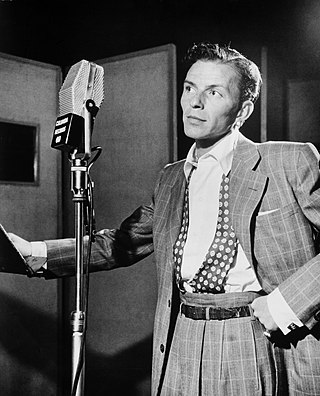
A crooner is a singer who performs with a smooth, intimate style that originated in the 1920s. The crooning style was made possible by better microphones that picked up quieter sounds and a wider range of frequencies, allowing the singer to access a greater dynamic range and exploit the proximity effect. This suggestion of intimacy was supposedly wildly attractive to women, especially a youth subculture known at the time as "bobby soxers". The crooning style developed among singers who performed with big bands, and reached its height in the 1940s to late 1960s.

"Where the Blue of the Night (Meets the Gold of the Day)" was the theme Bing Crosby selected for his radio show. It was recorded in November 1931 with Bennie Krueger and his Orchestra. The song was featured in a Mack Sennett movie short starring Bing Crosby. Crosby recorded the song on several occasions starting with the November 23, 1931 version with Bennie Kruger and his Orchestra. He next recorded it on July 20, 1940 with The Paradise Island Trio. On July 17, 1945 he recorded it with John Scott Trotter and his Orchestra and his final recording was on April 21, 1954 with Buddy Cole and his Trio for his Musical Autobiography set.

Bing: A Musical Autobiography was Bing Crosby's fourth Decca vinyl LP, recorded and released in 1954.

We're Not Dressing is a 1934 pre-Code screwball musical comedy film directed by Norman Taurog and starring Bing Crosby, Carole Lombard, George Burns, Gracie Allen and Ethel Merman. Based on the 1902 J. M. Barrie play The Admirable Crichton, the film is about a beautiful yacht owner (Lombard) who becomes stranded on an island with her socialite friends, a wacky husband-and-wife research team and a singing sailor (Crosby). The supporting cast features Leon Errol and Ray Milland.

Sing You Sinners is a 1938 American musical comedy film directed by Wesley Ruggles and starring Bing Crosby, Fred MacMurray, Ellen Drew, and Donald O'Connor. Written by Claude Binyon, the film is about three singing brothers who go to California to find their fortune. Initially the film was to be titled "The Unholy Beebes" and then "Harmony for Three" before finishing with "Sing You Sinners". Filming took place in April/May 1938 in Hollywood. Race track scenes were filmed at the Pomona Fairgrounds and at Santa Anita using two dozen of Crosby's horses. Sing You Sinners was premiered on August 5, 1938 at the Del Mar racetrack with the New York premiere taking place on August 16.

College Humor is a 1933 American pre-Code musical comedy film, directed by Wesley Ruggles, and starring Bing Crosby, Jack Oakie, Richard Arlen, Mary Kornman and Mary Carlisle. Based on a story by Dean Fales, the film is about a college professor and the school's star football player who become rivals for the same beautiful student. Released by Paramount Pictures, the film co-stars George Burns and Gracie Allen.
"Wrap Your Troubles in Dreams" (also known as "Wrap Your Troubles in Dreams (and Dream Your Troubles Away)") is a popular song written by Harry Barris with lyrics by Ted Koehler and Billy Moll, published in 1931.

Two for Tonight is a 1935 American musical comedy film directed by Frank Tuttle and starring Bing Crosby, Joan Bennett, and Mary Boland. Based on the play Two for Tonight by J. O. Lief and Max Lief, the film is about a songwriter who composes a full-length theatrical piece within a few days.

"I Surrender Dear" is a song composed by Harry Barris with lyrics by Gordon Clifford, first performed by Gus Arnheim and His Cocoanut Grove Orchestra with Bing Crosby in 1931, which became his first solo hit. This is the song that caught the attention of William Paley, president of CBS, who signed him for $600 a week in the fall of 1931.
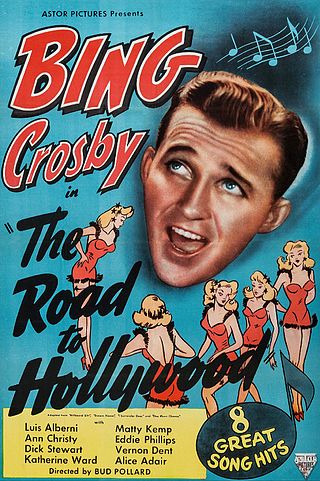
The Road to Hollywood is a 1947 American film released by Astor Pictures that is a combination of several of Bing Crosby's Educational Pictures short subjects. The title was designed to draft off Paramount Pictures' "Road to..." film series starring Crosby, Bob Hope, and Dorothy Lamour; Hope and Lamour do not appear in the film.

"At Your Command" is a 1931 song recorded by Bing Crosby on June 24, 1931 with piano accompaniment by Harry Barris. The lyrics were written by Bing Crosby and Harry Tobias, The music was composed by Harry Barris.
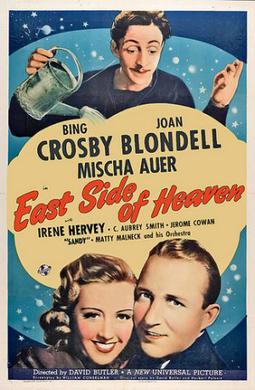
East Side of Heaven is a 1939 American musical film directed by David Butler and written by William M. Conselman and James V. Kern. The film stars Bing Crosby, Joan Blondell, Mischa Auer, Irene Hervey, C. Aubrey Smith, Robert Kent and Jerome Cowan. Filming took place in Hollywood from January 13 to March 7, 1939. The film was released on April 7, 1939, by Universal Pictures and had its New York premiere at Radio City Music Hall on May 4, 1939. This was another independent production in which Crosby had a financial interest.

Please is a 1933 short musical comedy film directed and produced by Arvid E. Gillstrom. It stars Bing Crosby as himself along with Vernon Dent and Mary Kornman.
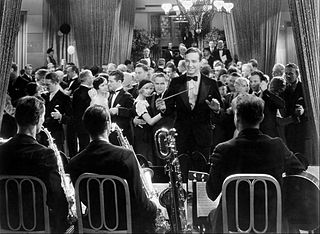
Crooner is a 1932 American pre-Code musical drama film directed by Lloyd Bacon and starring David Manners along with Ann Dvorak and Ken Murray. It concerns the abrupt rise and fall of a popular crooner, Teddy Taylor.
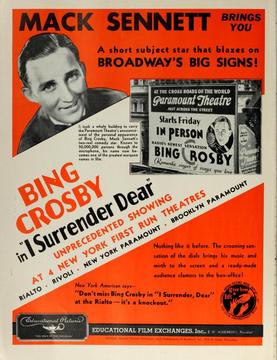
I Surrender Dear is a 1931 Educational-Mack Sennett Featurette starring Bing Crosby and directed by Mack Sennett. This was the first of the six short films Crosby made for Sennett and which helped launch his career as a solo performer.

Dream House is a 1931 Educational-Mack Sennett Featurette starring Bing Crosby and directed by Del Lord. This was the third of the six short films Crosby made for Sennett and which helped launch his career as a solo performer.

Billboard Girl is a 1932 Educational-Mack Sennett Featurette starring Bing Crosby and directed by Leslie Pearce. This was the fourth of the six short films Crosby made for Mack Sennett and which helped launch his career as a solo performer.
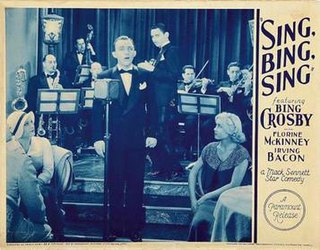
Sing, Bing, Sing is a 1933 Mack Sennett Star Comedy starring Bing Crosby and directed by Babe Stafford. It was the fifth of the six short films Crosby made for Mack Sennett and which helped launch his career as a solo performer.

Blue of the Night is a 1933 Mack Sennett Star Comedy directed by Leslie Pearce and starring Bing Crosby. It was the last of the six short films Crosby made for Mack Sennett and which helped launch his career as a solo performer.
"I Surrender Dear" is a 1931 jazz song.

















